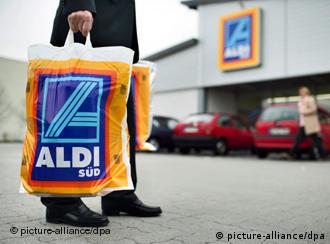
ALDI超市在澳洲发展得越来越好,至少我家已经成了ALDI的常客,仔细向下功能其实力和经营理念方式绝对非同小可。
事实上,ALDI是德国的零售业巨头,其创始人Theo Albrecht今年快86岁了,其个人身家175亿美元,在2007年的富比士杂志(Forbes magazine)全球富豪排行榜上列在第20位,比华人首富李嘉诚还要靠前两位。ALDI的名字就是这个家族的姓氏前两个字母,再加上折扣的前两个字母,(Albrecht Discounter),其核心经营理念非常简单,那就是:
最好的质量,最低的价格。
"When you can go in to any store, and get the best quality and you're guaranteed the lowest prices, there's no reason not to go there,"ALDI超市确实价廉物美,价格虽然便宜,但质量就一定不如Coles & Woolie吗?我个人的亲身经验是未必如此。
ALDI走的既是国际化又是本地化战略,蔬果奶制品之类的新鲜食物尽量本地化,而其它耐用消费品一般是全球配给,统一发货,大批量进货,以降低成本,而质量控制也做得很好。
而且ALDI的单位定价也是和其它两家超市巨头有所不同,在量价上非常透明,不做手脚。
据2007年7月,澳洲著名消费者杂志《Choice》曾做过一次调查,发现同样的食品,在Coles花费额$97.47元,在Woolworth花费$105.4元,而在Aldi只需$55.70元!

Choice sent out secret shoppers to buy a basket of 33 specific items at 111 supermarkets across the country. The basket at Coles cost $97.47, where 10 of the items were on special, while at Woolworths, where only two or three of the items were on sale, the basket came in at $105.43 - 8 per cent more than Coles.澳洲人被Coles和Woolworth这两家垄断的时间太久,盘剥的利润太多,似乎都已经麻木了。
The basket contained 28 branded products and five staples. At Aldi, which only sells products under its own brand, the cost of the basket dropped to $55.70, almost half the price of the major chains.
好在有了ALDI,在这两大绝对垄断的巨头夹缝里竟然生根发芽,并且有越来越蓬勃之势,这本身就说明了问题,就是最好的例证。










